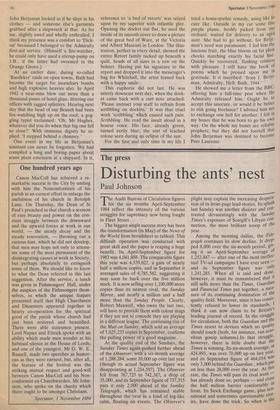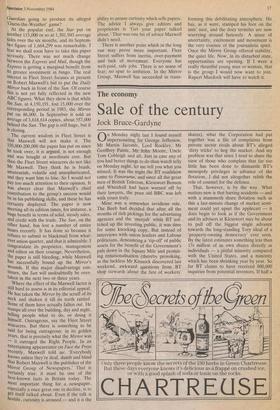The press
Disturbing the ants' nest
Paul Johnson
rr he Audit Bureau of Circulation figures 1. for the six months April-September 1984 reflect the intensity of the various struggles for supremacy now being fought in Fleet Street.
The biggest single success story has been the transformation (in May) of the News of the World from broadsheet to tabloid. This difficult operation was conducted with great skill and the paper is reaping a huge benefit. Its April-September figure for 1983 was 4,041,888. The comparable figure this year was 4,535,022, a gain of nearly half a million copies, and in September it averaged sales of 4,785,582, suggesting it may soon be back over the five million mark. It is now selling over 1,100,000 more copies than its nearest rival, the Sunday Mirror, and nearly a million and a half more than the Sunday People. Clearly, Robert Maxwell, who owns the last two, will have to provide them with colour mags if they are not to concede they are playing in a different league. The continuing rise of the Mail on Sunday, which sold an average of 1,625,233 copies in September, confirms the pulling power of a good magazine.
At the quality end of the Sundays, the Sunday Times again pushed further ahead of the Observer, with a six-month average of 1,288,284, some 10,000 up over last year (though its actual September figure was disappointing at 1,234,597). The Observer fell from 767,725 to 742,387, a drop of 35,000, and its September figure of 737,515 puts it only 2,000 ahead of the Sunday Telegraph, which has remained stable throughout the year in a kind of log-like calm, floating on events. The Observer's
plight may explain the increasing despera- tion of its front-page lead-stories. Its splash last Sunday was another disaster and con- trasted devastatingly with the Sunday Times's exposure of Scargill's Libyan con- nection, the most brilliant scoop of the year. Among the morning dailies, the Tele- graph continues its slow decline. It drop- ped 8,000 over the six-month period, giv- ing it an April-September average 01 1,252,847 — after one of the most ineffec- tual TV-ad campaigns I have ever seen --- and its September figure was only 1,241,285. When all is said and done, however, it must be remembered that it still sells more than the Times, Guardian and Financial Times put together, a mea- sure of its continuing domination of the quality field. Moreover, since it has consis- tently refused to lower its standards, I think it can now claim to be Britain, s leading journal of record. In the struggle for circulation, both the Guardian and the Times resort to devices which no quality should touch (both, for instance, run scur- rilous gossip columns),In that struggle, however, there is little doubt that the Times is winning. Its six-month average, at 424,893, was over 70,000 up on last year and its September figure of 464,054 was only 3,000 behind the Guardian , which Put on less than 28,000 over the year. At this rate, the Times will pass its rival soon --- has already done so, perhaps — and cross the half million barrier comfortably In front. Its Stock Exchange game, plus sen- sational and sometimes questionable stor- ies, have done the trick. So when is the Guardian going to produce its alleged `Guess-the-Weather' game?
At the popular end, the Star put on another 115,000 or so at 1,501,945 average sales over the six months, and its Septem- ber figure of 1,664,299 was remarkable. I fear we shall soon have to take this paper seriously. There was not much change between the Express and Mail, though the Express is getting a marginal benefit from its greater investment in bingo. The real interest in Fleet Street focuses at present on Robert Maxwell's bid to put the Daily Mirror back in front of the Sun. Of course this is not yet fully reflected in the new ABC figures. What they show is that while the Sun, at 4,150,191, lost 15,000 over the corresponding period in 1983, the Mirror Put on 86,000. In September it sold an average of 3,618,614 copies, about 557,000 behind the Sun. The gap is still huge, but it is closing.
The current wisdom in Fleet Street is that Maxwell will not make it. The 150,000-200,000 the paper has put on since he took over, it is argued, is not enough and was bought at inordinate cost. But then the Fleet Street wiseacres do not like Mr Maxwell. They think he is brash, amateurish, volatile and unsophisticated, and they want him to lose. So I would not Pay too much attention to their opinion. It was always clear that Maxwell's chief contribution to the group's success would be in his publishing skills, and these he has certainly displayed. The paper is now Meeting all its edition times, for instance, a huge benefit in terms of solid, steady sales, and credit with the trade. The Sun, on the other hand, has lost a number of entire issues recently. It has done so because it refuses to submit to blackmail from what- ever union quarter, and that is admirable: I congratulate its proprietor, management and editor on their courage. Nevertheless, the paper is still bleeding, while Maxwell has successfully bound up the Mirror's wounds. If this major disadvantage con- tinues, the Sun will undoubtedly be over- taken in the next two or three years.
Where the effect of the Maxwell factor is still hard to assess is in its editorial appeal. He has taken the Mirror by the scruff of its neck and shaken it till, its teeth rattled. Some of them have actually fallen out. He tramps all over the building, day and night, telling people what to do, or doing it himself. Outrageous, say the Fleet Street wiseacres. But there is something to be said for being outrageous: in its golden Years, that is precisely what the Mirior was it outraged the Right People. In an entertaining appeareance on Face the Press recently, Maxwell told us: 'Everybody knows unless they're deaf, dumb and blind that Robert Maxwell is the publisher of the Mirror Group of Newspapers.' That is certainly true: it must be one of the best-known facts in Britain today. The Most important thing for a newspaper, especially a once great one in decline, is to get itself talked about. Even if the talk is hostile, curiosity is aroused — and it is the ability to arouse curiosity which sells papers. The advice I always give editors and proprietors is 'Get your paper talked about.' That was one bit of advice Maxwell. didn't need.
There is another point which in the long run may prove more important. Fleet Street suffers from inertia, over-payment and lack of movement. Everyone has well-paid, safe jobs. There is no sense of fear; no spur to ambition. In the Mirror Group, Maxwell has succeeded in trans- forming this debilitating atmosphere. He has, as it were, stamped his foot on the ants' nest, and the dozy termites are now scurrying around furiously. A sense of uncertainty, excitement and movement is the very essence of the journalistic spirit. Once the Mirror Group offered stability, the quiet life. Now, in its disturbed state, opportunities are opening. If I were a really thrustful young man or woman, that is the group I would now want to join. Rupert Murdoch will have to watch it.











































 Previous page
Previous page